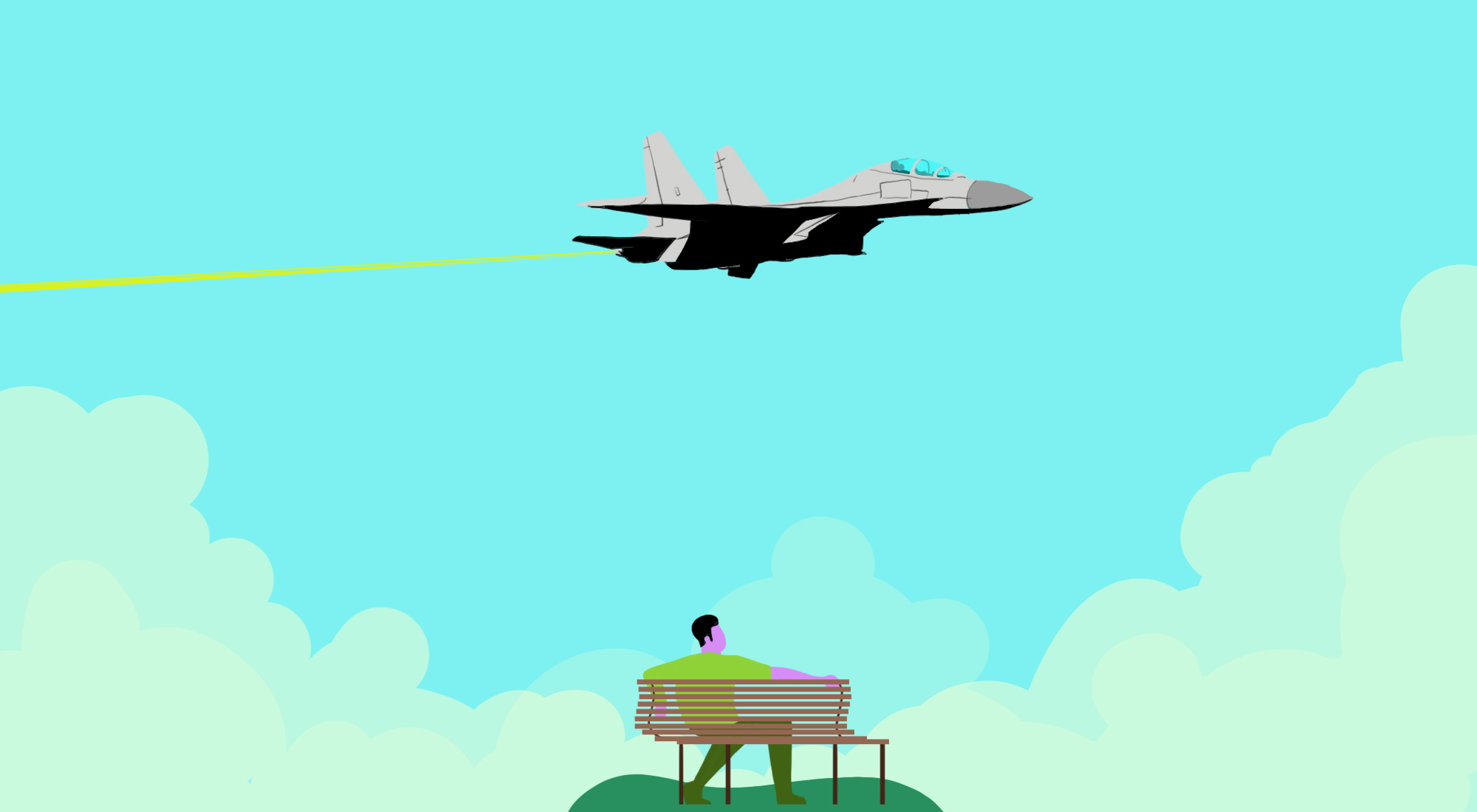Mainland China invasion? Taiwan residents aren’t worried
Taiwan’s Minister of National Defense, Chiu Kuo-cheng, recently warned that China will have the capability to invade Taiwan by 2025. But everyday people don't seem worried.

On an early October evening in Taipei’s Shida night market, the summer heat has finally begun to lift, and the streets are busy with students from two neighboring universities. Having overcome its first major COVID-19 wave, many people are talking about when they might be able to get their second vaccine or visit karaoke bars again. No one seems much concerned about the Chinese warplanes that have been flying into the island’s Air Defense Identification Zone (ADIZ). This does not seem like a place that is preparing for a possible war, as some say.
But then again, military threats from China rarely dominate news headlines in Taiwan, and Taiwanese aren’t making escape plans; to most, the recent flyovers are business as usual.
“[China] hasn’t only done this once or twice, we’ve gotten used to it after seeing it for so long,” said Fan He, a 19-year-old student at the nearby National Taiwan Normal University. “And the military is too far from people’s lives. It’s just not realistic to us.”
According to a 2020 poll conducted by the Kuomintang (KMT)-affiliated National Policy Foundation, 60 percent of Taiwanese respondents believed that a war between Taiwan and China was unlikely or impossible.
But much has changed in the last year. October has seen more than 150 Chinese warplanes dispatched into the southwest region of Taiwan’s ADIZ. Daily records of flybys were also broken three times this month, with 38 military planes dispatched on October 1, China’s National Day, followed by 39 on Saturday and another 56 on Monday, as reported by Taiwan’s Ministry of National Defense. Experts believe this type of activity could continue as Taiwan’s National Day, also known as Double Ten Day, approaches on October 10.
The total number of flybys in 2021 has surpassed 600, up from 380 last year. On Wednesday, Taiwan’s Minister of National Defense, Chiu Kuo-cheng (邱国正 Qiū Guózhèng), warned that China will have the capability to invade Taiwan by 2025, adding that the situation “is really the most dangerous I have seen in my more than 40 years in the military.” In an editorial published this week in Foreign Affairs, President Tsai Ing-wen (蔡英文 Cài Yīngwén) pledged that “Taiwan will do whatever it takes to defend itself” if its democracy is challenged.
“Beijing has routinized their air activity in the region, almost making it their training zone where they can exercise battlefield management,” said Eric Lee, associate director of programs at the Project 2049 Institute. “By sending aircraft into this area, they can train while also putting pressure on Taiwan, the U.S., as well as the broader international community.”
Discussions over whether the People’s Republic of China will invade Taiwan have become frequent in the international news cycle over the past year. Part of this is because there’s been more to discuss. Within the past several weeks alone, the U.S., U.K., and Japan conducted joint exercises in the Pacific; the U.S. reportedly considered changing the name of “Taipei Economic and Cultural Representative Office” in Washington to the “Taiwan Representative Office”; and Taiwan applied to join the CPTPP, as Japan and countries across Europe continue to donate vaccines to Taiwan in moves that have challenged Beijing’s claim over the island.
Bonnie Glaser, director of the Asia Program at the German Marshall Fund, said at a panel hosted by the Aspen Institute on Monday that a military conflict over the Taiwan strait is not inevitable, “but its prospects for a legal or de jure independence I think are not very great.”
“I don’t think this is a prelude to an invasion of Taiwan,” she said, adding that the recent air activity is “certainly intended to pressure Taiwan and to signal that Taiwan should not challenge Beijing’s sovereignty and cross its red lines.”
Other experts have said the recent activity is a psychological attack. “When we were young here in Taiwan, the education or propaganda by the [KMT] government was mostly the same to the PRC’s now, trying to weaken the confidence of people,” said Mark Chen, chairman of the Taiwan-based Prospect Foundation and a former Minister of Foreign Affairs. “So that psychological warfare has been going on for many, many years.”
Older people — who are more likely to support closer economic and political ties with China — seem to be more worried, citing a weak military and complacent youth who place too much trust in the U.S. One 65-year-old coffee store owner (who didn’t want to be named) said he worried calls for international recognition and increased support from Western countries were provoking China.
“If you say ‘Taiwan is independent’ and everyone agreed and was peaceful, then no one would object to it. But if you say ‘after winning a possible war, you can become independent,’ then you really need to think more clearly about it,” the man said. “We Taiwanese, the common people, we don’t want a war.”
China news, weekly.
Sign up for The China Project’s weekly newsletter, our free roundup of the most important China stories.
According to the latest poll from the National Chengchi University Election Study Center, most respondents want Taiwan to “maintain the status quo” at this time, but a growing number say it should move toward independence at a later date, with a minority supporting unification with China. A majority of people identify as Taiwanese only, a figure that has grown since Taiwan’s democratization, while 31 percent identify as both Taiwanese and Chinese. Less than 3 percent identify as Chinese only.
Despite the fact that many seem unbothered by recent provocations from Beijing, that doesn’t mean they aren’t aware of the danger and what is at stake.
He, the student, says recent events like the passing of the National Security Law in Hong Kong have served as a wake-up call to Taiwanese that their freedoms may be at risk. And while experts have said that Afghanistan should not be compared with Taiwan, America’s departure has generated many questions whether the U.S. would come to Taiwan’s aid in the event of an invasion.
“The situation in Hong Kong reminded us of the reality. But we don’t think about it all the time, since there’s not much we can do,” she said.






